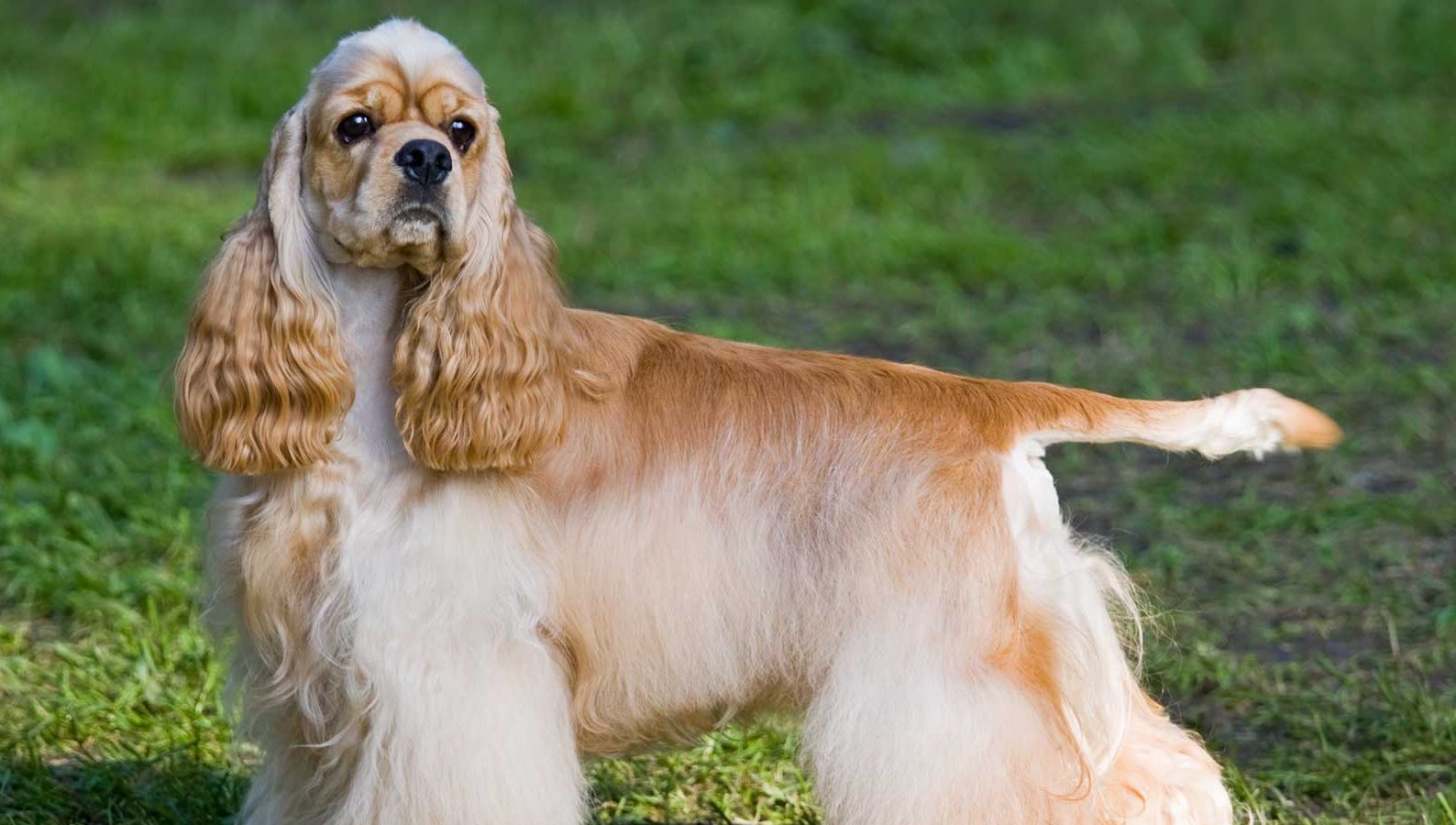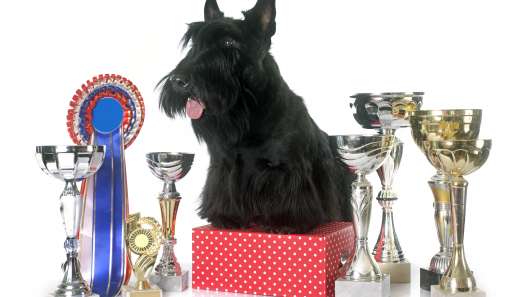-
Activity Level:
moderate
-
Shedding Level:
low
-
Grooming Level:
high
-
Trainability:
high
-
Good for Novice Owners:
high
-
Adaptability:
high
-
Kid/Pet Friendly:
often
-
Prey Drive:
high
-
Watchdog:
aware
- Average Size: Small
- Average Lifespan: 10-14 years
- Registered?: aca, akc
Cocker Spaniel Dog Breed Information
Overview
Temperament
Adaptability
Health
Owner Experience
Grooming
Activity Level
Size
Life Span
Did You Know?
The Cocker Spaniel has origins in both Spain and the U.K. and is a popular dog breed with a jovial and sweet personality. Being the smallest member of the American Kennel Club’s sporting group, the energetic Cocker Spaniel’s original purpose was as a hunting or “bird” dog.
The AKC first recognized Cocker Spaniels in 1878. They later separated the U.S. type and British type into separate Spaniel breeds in the 1940s. The AKC recognized the English Cocker Spaniel in 1946 to further standardize the separation. Today, the Cocker Spaniel has become more of a companion breed for most people. However, they still have the characteristics of the original hunting breed in many ways.
For a period between the 1930s and 1950s, the Cocker Spaniel was one of the most popular and most registered dogs with the AKC in the United States. Now, they are one of the most popular show dog breeds. All things considered, the Cocker Spaniel makes for a fantastic family pet and a welcome addition to any home.
Cocker Spaniels have playful and jubilant personalities. They are also very affectionate and prefer to be adored by their favorite people. Although one of the facts about Cocker Spaniels is that they can be prone to affectionate nipping, these dogs tend to be very friendly and family-oriented.
Well-socialized Cocker Spaniels tend to get along well with children, other dogs, and even strangers. Being a bird dog, they do have a high prey drive and urge to chase, so it’s recommended that they are not off-leash unless they are in secure areas. They can also be prone to barking a lot. This is usually alert barking, but if you do not train your dog to stop barking early on and socialize them well, they can end up barking at everything.
The Cocker Spaniel is a highly adaptable dog breed. They can thrive on a 10-acre farm or a condo in Manhattan; all it takes is the right amount of activity, exercise, and attention. They also do well in moderate climates.
As a brachycephalic breed, they are very sensitive to heat. Although their coat offers some protection from the cold, they are small dogs and are not a snow dog breed. Because of this, you will want to have some winter dog products on hand to help your Cocker Spaniel stay warm when out on walks with you in the cold.
These little dogs also tend to be alert. This, paired with their hunting dog background, can make Cocker Spaniels sensitive to chaotic environments or large gatherings. Make sure to ease your pup into the settings and reassure them.
Despite the potential for sensitivity, this dog breed thrives on attention, so they do not do well if left alone for long periods of time. A Cocker Spaniel will need to be an active, everyday part of your family activities to be happy and healthy.
Potential health concerns to be aware of in Cocker Spaniels can include hip dysplasia, luxating patella, and eye disorders. Their large, soulful eyes also mean they can be prone to developing cataracts and other common eye problems in dogs later in life. Good breeding practices make a big difference in the health of Cocker Spaniel puppies.
Reputable breeders will screen their dogs to avoid passing preventable issues to puppies. Make sure you ask the breeder about the health and genetic history of both parents. You can also ask about any health tests or clearances that have been done. The American Spaniel Club recommends a hip evaluation and an ophthalmologist evaluation at a minimum.
The Cocker Spaniel is a highly intelligent dog that is eager to please. They respond best to consistent training focused on praise and positive rewards. Provided they understand what you are asking of them, they strive to meet and exceed your expectations.
Harsh tones or corrections can damage the bond with your dog and result in a Cocker Spaniel that seems like they have a stubborn streak. Unclear or confusing training can also cause your dog not to listen to you; not necessarily because they don’t want to, but because they don’t understand what you are asking of them.
These dogs are a great fit for first-time dog owners, but don’t be afraid to enroll in puppy training classes anyway. There are plenty of benefits of puppy training classes that make them a good idea, including socialization, bonding, and more.
The Cocker Spaniel has a long, smooth, and wavy coat, which will require daily brushing and care to remain tangle-free and healthy. Ignoring a Cocker Spaniel’s coat and not grooming them properly can lead to tangles and mats. Grooming is recommended every 4-6 weeks with baths in between as needed. If your Cocker Spaniel is active with you outside a lot, they may need a bath in between grooming visits if they get into things.
In addition to coat care, you will also need to take care of your Cocker Spaniel’s nails, ears, and teeth. Nail trims once or twice monthly keep nails from growing too long. Weekly ear checks, along with careful cleanings as needed, can help prevent ear infections. Daily tooth brushing and cleanings at the vet when needed can help prevent dental diseases later in life.
As a puppy, using dog grooming brushes at the same time as stroking the coat with your hand is a good way for your pet to get used to the feeling of being groomed. You can also get them used to having their paws, ears, and mouth handled. With care and attention, grooming can become a bonding experience for you and your puppy, and one they will love.
Although the Cocker Spaniel is a bird dog and a sporting breed with a high prey drive, they are not considered high-energy dogs. They tend to sit in a more moderate range. Daily walks plus some playtime and time to run are usually enough for these little dogs.
They love spending time with you, so will often be up for more activity if you are. Just make sure Cocker Spaniel puppies are finished growing and have been cleared by the vet before taking on higher-impact activities to avoid damaging developing bones and joints.
Fully-grown Cocker Spaniels usually stand 13-5-15.5 inches tall and weigh 20-30 pounds.
Cocker Spaniels generally live for 10-14 years on average.
“That’s Amore!” An animated version of an American Cocker Spaniel portrayed one of the main characters “Lady” in the 1955 Disney feature film “Lady and the Tramp” and the 2019 remake; one of the classic dog movies.









